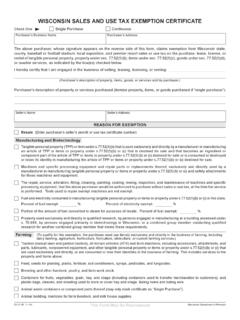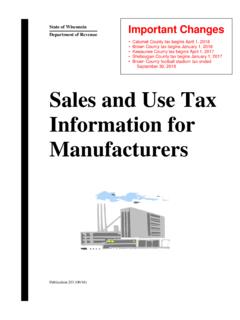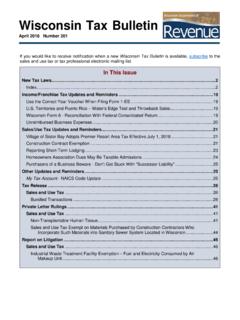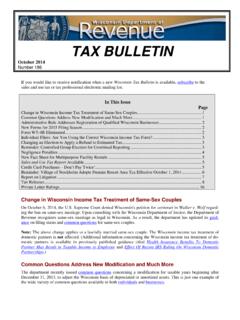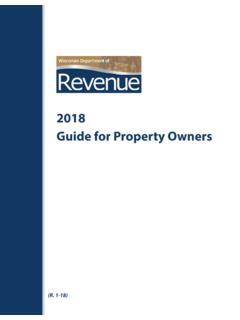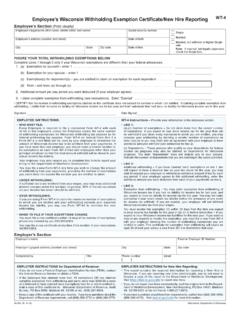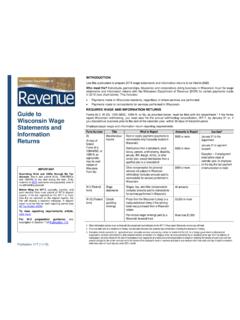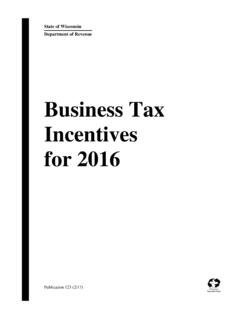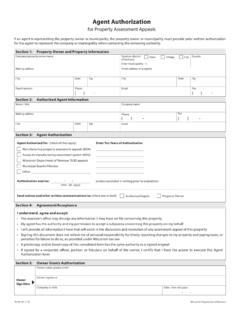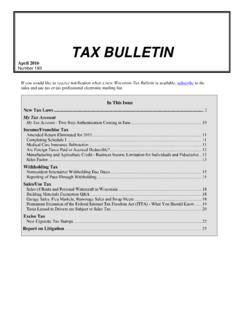Transcription of Farm Suppliers And Farmers - Wisconsin Department of …
1 State of Wisconsin Department of Revenue Important Changes Menominee County tax begins April 1, 2020. Baseball stadium district tax ends March 31, 2020. Outagamie County tax begins January 1, 2020. Calumet County tax begins April 1, 2018. Brown County tax begins January 1, 2018. Kewaunee County tax begins April 1, 2017. Sheboygan County tax begins January 1, 2017. Brown County football stadium tax ended September 30, 2015. Farm Suppliers And Farmers How Do Wisconsin Sales and Use Taxes Affect Your Operations? Publication 221 (03/16). Printed on Recycled Paper TABLE OF CONTENTS. Page I. 4. A. General .. 4. B. Nature of Sales and Use Taxes .. 5. 1. Sales 5. 2. Use tax .. 5. C. Who Must Obtain a Seller's Permit .. 5. D. Who Must Obtain A Use Tax Registration Certificate .. 5. E. How to Obtain a Seller's Permit or Use Tax Registration Certificate.
2 6. F. Collecting State and Local Sales and Use Taxes .. 6. G. Filing Tax Returns and Payment of Tax .. 7. 1. How Often Must a Return Be Filed? .. 7. 2. Electronic Filing and Payment Options Available for Sales and Use Tax Returns .. 7. II. WHICH SALES ARE SUBJECT TO SALES AND USE TAXES? .. 8. III. DEFINITION OF FARMING .. 9. IV. TAXABLE SALES OF PRODUCTS TO 10. A. Licensed Motor Vehicles .. 10. B. Tools Used in Real Property Improvements .. 11. C. Building Materials .. 11. D. Other Taxable Sales of Products .. 12. V. EXEMPT SALES OF PRODUCTS TO Farmers .. 12. A. Introduction .. 12. B. Tractors and Machines Including Accessories, Attachments, and Parts; Lubricants; Nonpowered Equipment;. and Other Tangible Personal Property and Items, Property, and Goods .. 13. 1. General .. 13. 2. Requirements for exemption.
3 13. 3. Examples .. 16. C. Seeds for Planting and Plants .. 19. D. Feed .. 19. 1. Feed .. 19. 2. Feed lots .. 19. E. Fertilizer and Soil Conditioners .. 20. F. Sprays, Pesticides, and Fungicides .. 20. G. Containers for Fruits, Vegetables, Grain, Hay, Silage, and Animal 21. H. Farm Livestock Drugs .. 22. I. Other Exempt Sales to Farmers .. 23. 1. Animal bedding .. 23. 2. Baling twine and baling wire .. 23. 3. Electricity .. 23. 4. Farm work stock .. 23. 5. Mobile cement mixers .. 23. 6. Fuel .. 23. 7. Livestock and poultry .. 23. 8. Semen for artificial insemination of livestock .. 24. 9. Animal identification tags sold by the Wisconsin Department of Agriculture, Trade, and Consumer Protection24. 2. 10. Standard samples sold by the Wisconsin Department of Agriculture, Trade, and Consumer 24. 11. Packaging and shipping materials.
4 24. VI. TAXABLE SERVICES SOLD TO Farmers .. 24. A. Repair or Service to Products .. 24. B. Other Taxable Services .. 24. VII. EXEMPT SERVICES SOLD TO 25. A. Repair or Service to Exempt 25. B. Custom Farming Services .. 25. C. Other .. 26. VIII. SALES OF PRODUCTS BY 26. A. Taxable Sales of Products by Farmers .. 26. B. Exempt Sales of Products by Farmers .. 26. IX. SALES OF SERVICES BY 27. A. Services performed to products .. 27. B. Admissions to amusement, athletic, entertainment, or recreational events or places .. 28. C. Access to or the use of amusement, athletic, entertainment, or recreational devices or facilities .. 28. X. WHEN AND WHERE A SALE OCCURS .. 28. A. When a Sale Occurs .. 28. B. Where a Sale Occurs .. 28. XI. RECORDKEEPING .. 30. A. General Records to Keep .. 30. B. Records to Keep - Exemption Certificates.
5 31. C. Records to Keep - Sales to Exempt Organizations .. 31. D. Records to Keep - Buyer Holds Direct Pay Permit .. 31. XII. IF YOU HAVE QUESTIONS .. 32. APPENDIX A .. 33. 3. Publication 221. IMPORTANT CHANGES. Football Stadium District Tax Terminated. The Green Bay/Brown County football stadium district sales and use tax terminated on September 30, 2015. Exemption for Farm-Raised Deer. Beginning on January 1, 2016, sales of farm-raised deer, as defined in sec. (1)(ag), Wis. Stats., sold to a person operating a hunting preserve or game farm in Wisconsin are ex- empt from Wisconsin sales and use taxes. See Part , on page 26. I. INTRODUCTION. A. General This publication explains how Wisconsin state sales and use taxes affect Farmers , farm supply companies, farm implement dealers, and farm cooperatives. As used in this publication, the term "product" or "products" refers collectively to the property, items and goods described in Part to D.
6 As used in this publication, digital goods refers collectively to specified digital goods, additional digital goods, and digital codes described in Part Specific information about digital goods is available in Publi- cation 240: Digital Goods How Do Wisconsin Sales and Use Taxes Apply to Sales and Purchases of Digital Goods, available online at Certain sales to Farmers which are subject to the 5% state sales or use tax may also be subject to the (1) county sales or use tax, (2) baseball stadium sales or use tax, and (3) local exposition taxes. Additional in- formation about these taxes is contained in the following: (1) County tax: Publication 201, Wisconsin Sales and Use Tax Information, Part XVIII. (2) Baseball stadium tax: Publication 201, Wisconsin Sales and Use Tax Information, Part XVIII. Applies to sales and purchases made in Milwaukee, Ozaukee, Racine, Washington, and Waukesha counties.
7 (3) Local exposition taxes: Publication 410, Local Exposition Taxes. These taxes apply to sales and purchases of certain lodging; candy, soft drinks, and prepared foods; alcoholic beverages for consumption on the seller's premises; and car rentals in municipalities located wholly or partially within Milwaukee County. Publications 201 and 410 are available on the Department of Revenue's website at CAUTION. The information in this publication reflects the positions of the Wisconsin Department of Revenue of laws enacted by the Wisconsin Legislature and in effect as of March 1, 2016. Laws enacted and in effect after that date, new administrative rules, and court decisions may change the interpretations in this publication. The examples and lists of taxable and nontaxable sales are not all-inclusive. They merely set forth common examples.
8 4. Farm Suppliers and Farmers - How Do Wisconsin Sales and Use Taxes Affect Your Operations? B. Nature of Sales and Use Taxes 1. Sales tax is imposed on retailers who sell, license, lease, or rent any taxable products or services at retail, if the transaction occurs at a location in Wisconsin as determined in Part The tax is based on the retailer's sales price from such transactions. 2. Use tax is imposed on purchasers of any taxable products or services purchased from a retailer, if: (a) the product or service is stored, used, or consumed in Wisconsin by the purchaser in a taxable manner, and (b) no Wisconsin sales tax was paid by the purchaser to the retailer of the product or service. The use tax is based on the purchase price of the product or service paid by the purchaser to the retailer. C. Who Must Obtain a Seller's Permit Every individual, partnership, corporation, or other organization making sales, licenses, leases, or rentals at retail of any taxable product or services in Wisconsin as determined in Part , is required to have a seller's permit, unless all sales licenses, leases, or rentals by the seller are exempt from sales or use tax.
9 D. Who Must Obtain A Use Tax Registration Certificate Although a retailer may have no location in Wisconsin from which sales, licenses, leases, or rentals of any taxable product or services at retail are made, the retailer is engaged in business in Wisconsin , for purposes of the use tax, if one or more of the following conditions exist: The retailer owns any real property in Wisconsin . The retailer licenses, leases, or rents out any property, items, or goods located or used in Wisconsin . The retailer maintains, occupies or uses, permanently or temporarily, directly or indirectly, or through a sub- sidiary, agent, or other person, an office, place of distribution, sales or sample room or place, warehouse, or storage place, or other place of business in Wisconsin . (See exception for foreign corporation publishers.)
10 The retailer has any representative, agent, salesperson, canvasser, or solicitor operating in Wisconsin under the authority of the retailer or its subsidiary for the purpose of selling, delivering, or taking orders for any property, items, goods, or taxable services. The retailer services, repairs, or installs, in Wisconsin , any property, items, or goods. The retailer delivers any property, items, or goods into Wisconsin in company operated vehicles. The retailer performs construction activities in Wisconsin . Any person who has an affiliate in this state, if the person is related to the affiliate and if the affiliate uses fa- cilities or employees in this state to advertise, promote, or facilitate the establishment of or market for sales of items by the related person to purchasers in this state or for providing services to the related person's purchas- ers in this state, including accepting returns of purchases or resolving customer complaints.
